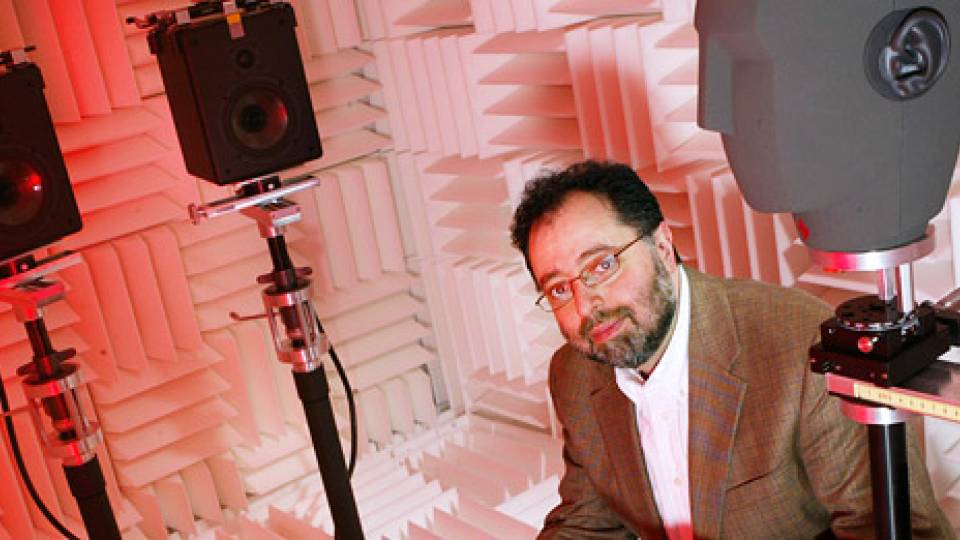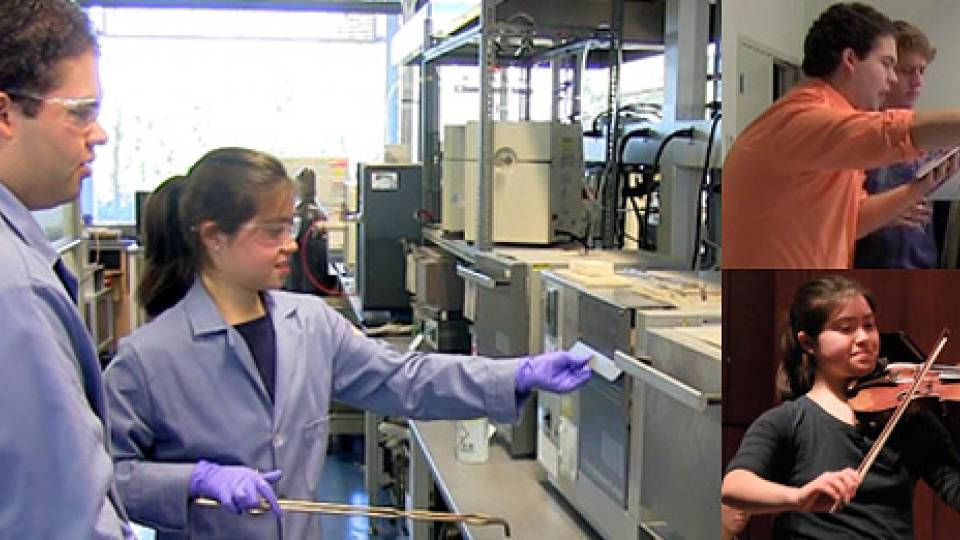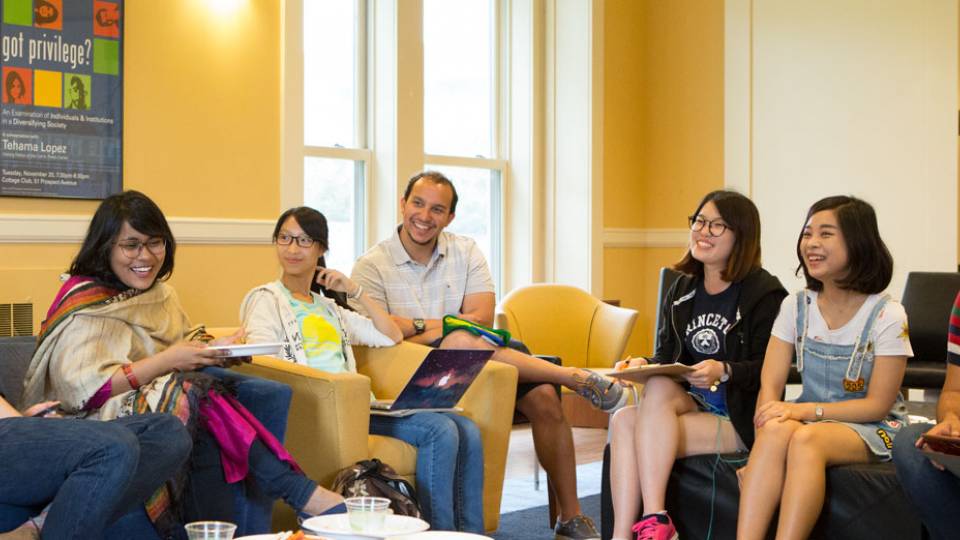For many Princeton undergraduates, summertime is focused on life in the laboratory.
Although classes are not in session, more than 100 undergraduates remain on campus during the summer months to work in labs across campus. These students pursue opportunities to serve as research interns or assistants for faculty members, or to work on their own independent projects under the guidance of Princeton researchers.
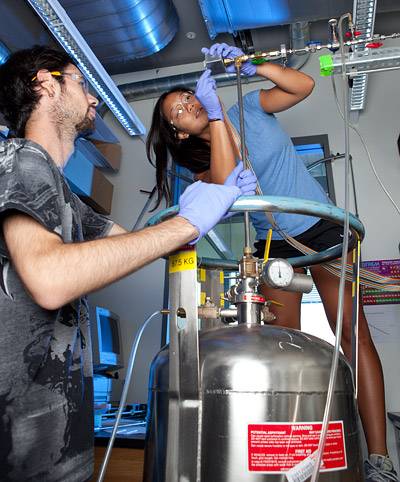
Michael Fuccillo (left), a graduate student in chemistry, helps rising senior Megan Charles prepare a liquid helium tank that is used by members of Professor Robert Cava's lab to measure the thermoelectric properties of crystals.
A common thread unites students from various departments who spend their summer in labs: gaining experience in intensive projects as well as insights into the duties and discipline required of advanced researchers in their field.
Jasmine Hay, a rising senior who is majoring in chemistry, is working this summer in the lab of faculty member Robert Cava to conduct research for her senior thesis, which involves synthesizing various chemical compounds to evaluate their magnetic properties at different temperatures.
"I have really enjoyed being here in the summer. It's a lot easier to do things when you're here all day every day and you're able to work uninterrupted without having to rush off to a class and then come back to the lab," Hay said. "I'm really looking forward to my thesis now."
Like other undergraduates working in labs over the summer, Hay is being guided not only by a faculty member, but also by postdoctoral researchers and graduate students. She also is learning about projects conducted by fellow undergraduates spending the summer under the guidance of Cava, who is Princeton's Russell Wellman Moore Professor of Chemistry.
"We have a really wonderful lab, and everyone's willing to talk about what they're doing," she said. "I'm learning a little bit about what everyone's doing and I'm doing my own research, so it's been a lot of fun."
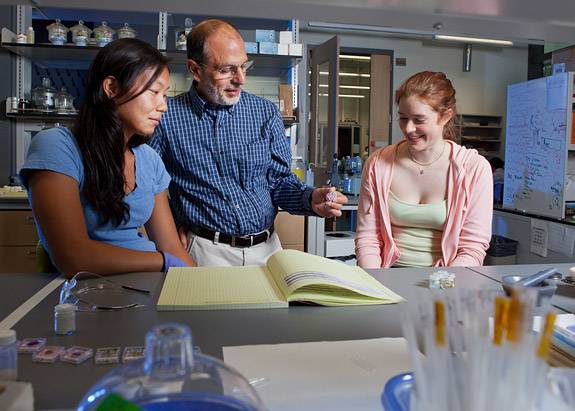
Charles and classmate Jasmine Hay (right) are working with Cava (center) this summer to conduct research for their senior thesis projects in the chemistry department. Cava is holding a compond synthesized by Hay for her thesis project, which focuses on the magnetic properties of various compounds.
Katherine Bedkowski, a rising junior who is majoring in the Department of Chemical and Biological Engineering, has enjoyed a similar experience while working in the lab of Alexander Smits, Princeton's Eugene Higgins Professor of Mechanical and Aerospace Engineering and chair of the department.

Rising junior Katherine Bedkowski (left), a summer intern in the lab of Professor Alexander Smits, works with graduate student Gilad Arwatz (right) to prepare for an experiment using a rheometer to measure the viscosity of blood. Among other projects, students in Smits' lab this summer are conducting research on how blood reacts when put under severe stress. This research is related to the development of heart-lung machines, the devices that keep patients alive during heart surgeries.
Among other projects, students in Smits' lab are examining how manta rays and other aquatic animals propel themselves through water, with the aim of informing the development of underwater vehicles. The students also have conducted research on how blood reacts when put under severe stress, as part of Smits' work on the development of heart-lung machines, the devices that keep patients alive during heart surgeries.
The projects relate to Bedkowski's interest in biomechanics and applied mathematics, and have provided a window into possibilities that lie ahead after she graduates from Princeton.
"It has been nice to get a really in-depth focus on what research and life as a graduate student would be like," she said.
Smits, who has six undergraduate interns in his lab this summer, said the experience is invaluable in helping students evaluate their undergraduate research plans and their postgraduate options.
"I try very hard to bring undergraduates into the lab, both for thesis projects and also for summer internships, because I think it gives them an exposure to how research is done," he said. "They can find out if it's something they would like to do in the future, and I think it has inspired a lot of students to go on and pursue a research career. It has also given me lots of new ideas for future research projects, so it's win-win."
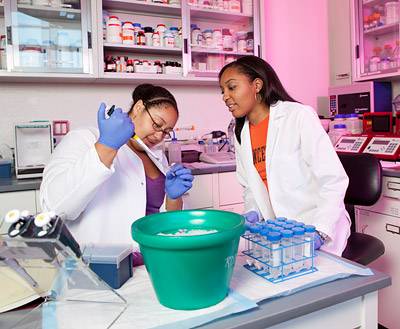
Graduate student Jessica Rowland (right) has served as a mentor to Thomas, including instructing her in lab techniques, as the undergraduate has spent the summer focusing on research for her senior thesis in the lab of Burdine, a developmental biologist.

From left, rising junior Birgitt Boschitsch joins graduate student Daniel Quinn and Smits in reviewing the equipment used in water-channel experiments that are conducted in Smits' lab. The water channel includes a shielded laser and is used to illuminate and record images of particles flowing through liquid. Boschitsch is one of six undergraduates working as summer interns in Smits' lab, contributing to his research on the development of underwater vehicles.

